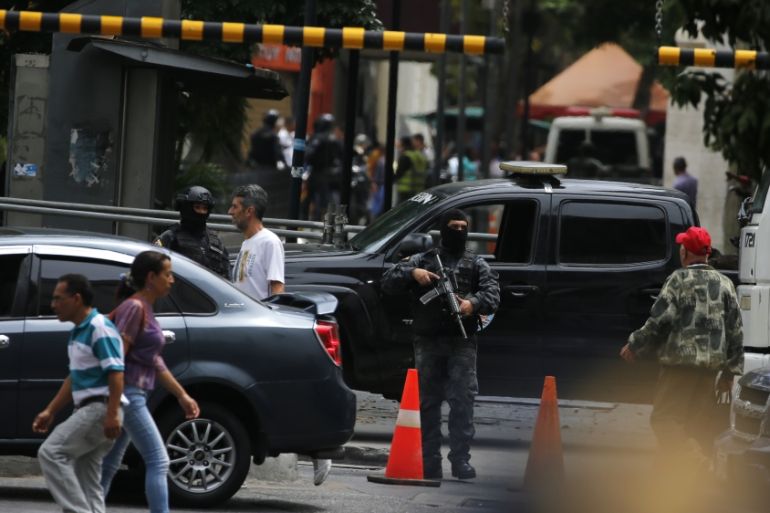UN report: Venezuela death squads kill young men, stage scenes
Security forces conduct ‘shockingly high’ number of extrajudicial killings, new report by UN rights chief says.

Venezuelan security forces are sending death squads to murder young men and stage the scenes to make it look like the victims resisted arrest, a new UN report said.
Government figures showed deaths ascribed to criminals resisting arrest numbered 5,287 last year and 1,569 by May 19 this year. The report, issued on Thursday by United Nations human rights chief Michelle Bachelet, decried a “shockingly high” number of extrajudicial killings.
Keep reading
list of 4 itemsChile calls for the extradition of Venezuelans after dissident’s murder
Argentina claims to be sheltering Venezuelan opposition leaders in embassy
Faced with an election ban, Venezuela opposition leader names alternate
Families of 20 men described how masked men dressed in black from Venezuela’s Special Action Forces (FAES) arrived in black pick-up trucks without licence plates. Witnesses said the death squads broke into houses, took belongings, and assaulted women and girls, sometimes stripping them naked.
“They would separate young men from other family members before shooting them,” the UN report said.
“In every case, witnesses reported how FAES manipulated the crime scene and evidence. They would plant arms and drugs and fire their weapons against the walls or in the air to suggest a confrontation and to show the victim had ‘resisted authority’,” it added.
The report – which drew on 558 victim accounts, witnesses of violence and other sources – said the killings were part of a strategy by the government of President Nicolas Maduro aimed at “neutralising, repressing and criminalising political opponents and people critical of the government”.
Interviewees consistently referred to FAES as a “death squad” or “extermination group”. NGOs say it is responsible for hundreds of killings.
‘Venezuelans deserve a better life’
Bachelet visited Venezuela last month and will present the report to the UN Human Rights Council on Friday.
The UN also released a written response to its findings by Venezuela’s government, which called the report a “selective and openly partial vision” about the human rights situation in the South American country. It argued the UN relied on “sources lacking in objectivity” and ignored official information.
|
|
“An analysis that privileges negative testimonies to the extreme, while hiding or minimising measures adopted to advance human rights, is not objective or impartial,” read the government’s response.
Bachelet said in a statement that she had the government’s commitment to work with the United Nations to resolve some of the thorniest issues, including the use of torture and access to justice, and to allow full access to detention facilities.
“I sincerely hope the authorities will take a close look at all the information included in this report and will follow its recommendations. We should all be able to agree that all Venezuelans deserve a better life,” Bachelet said.
“A Catholic priest in Caracas said to me: ‘This is not about politics, but about the suffering of the people.’ This report too is not about politics, geopolitics, international relations or anything other than being about the human rights to which every Venezuelan is entitled,” she added.
‘Criminal enterprise’
The UN report came after former Venezuela spy chief Manuel Cristopher Figuera told The Associated Press on Tuesday that Maduro’s administration was a “criminal enterprise”.
Maduro personally commissioned a coterie of human rights abuses under his watch, including arbitrary detentions and the planting of evidence against opponents, Figuera said.
“I am like a soldier who raises the flag upside-down in the international sign of distress. I am looking for help to free my country from the disgrace that it is living through now,” he said.
Figuera defected from the Venezuelan government shortly after being blacklisted by the United States in February over alleged “mass torture, mass human rights violations and mass persecution against those who want democratic change”.
Maduro has blasted Figuera as a traitor and accused him of working as a mole for US intelligence services for more than a year.
US President Donald Trump‘s administration has sanctioned dozens of Venezuelan officials, power brokers and businesses it accuses of raiding public coffers and carrying out human rights abuses against people struggling to survive, as the country collapses amid a spiralling economic and political crisis.
The sanctions list includes Maduro, considered illegitimate by Washington since his re-election in a ballot last year marred by opposition boycotts and allegations of irregularities.
The US and some 50 other nations have since backed Juan Guaido, leader of the opposition-controlled National Assembly legislature, in his campaign to overthrow Maduro and assume power.
Maduro, whose main backers also include Russia and China, has accused the US of leading an imperialist economic war against oil-rich Venezuela.